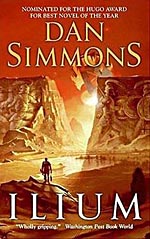
![]() couchtomoon
couchtomoon
6/17/2014
![]()
There's an episode of South Park("Cartoon Wars Part II") that reveals that the writers of Family Guy are actually manatees in a tank who are trained to push around idea balls (beach balls with nouns or pop culture references written on them) into a random sequence for each of the show's cutaway gags (Ex. Peter-World Cup-Britney Spears' vagina). Since viewing that episode, I've read a few science fiction novels that feel like the product of a similar process, particularly when they combine previously unrelated SF tropes into a story that seems contrived just for the purpose of combining those tropes. Hmmm, steampunk Civil War zombies, anyone?
It's a fine line, to be sure. Some of my favorite novels can be reduced to a similar formula, but what makes them special is what goes on to genuinely link those tropes. Sure, the tropes provide an interesting world to tell a story, but does that world exist simply to mash those concepts together? Or, does the combination of those tropes illustrate a greater meaning, uncover a mystery of the human condition, explore a potential possibility? Does it at least tell a good story?
In this case, Dan Simmons' Ilium (2003) is problematic. A likewise hodge-podge of popular tropes, but his manatees need a bigger tank for all of his idea balls: Trojan War – Mars – quantum teleportation – cyberbots – Jupiter – Shakespeare – mystery doomsday device – far future Earth – Eloi – Wandering Jew – dinosaurs… I'm struggling to think of tropes this story doesn't use. Time trav- nevermind. Cryogenic freez- wait, that's there, too. Artificial Intell- argh, no. Vampir — geez, kind of.
Werewolves. There. Ilium is not about werewolves.
It's problematic because Dan Simmons does offer a significant point to his story. He wants to illustrate the importance of art, literature, and culture in a world simultaneously advancing and eroding by technological means. And his future world is no doubt imaginative and nightmarish. And he is clearly in love with his classical and literary subjects. But I'm not sure that's enough.
Ilium is the first part of a 2-part epic in Simmon's Ilium/Olympos cycle. The story is a combination of three unrelated stories that alternate until they converge, hinting at more connected stories in the sequel. The three stories are:
I enjoyed this novel until 42% in, when it became clear that the story simply exists as a framework to throw all these worlds together. Each story thread has little to no stakes on which to motivate the simple characters from one square to the other on Simmon's celestial chessboard. Hell, checkerboard, because movement is only in one direction, and that direction is Mars. That much is obvious.
Speaking of Mars, the Trojan War that Hockenberry must witness takes place on Mars. I knew this from reading the cover blurb before tackling the book. Somehow I missed the fact that Hockenberry doesn't know this. The whole time he is struggling with his strange reality of viewing the war and interacting with major characters, which was all an obvious farce—to me. Perhaps some of the suspense was lost in this misunderstanding that probably could have been avoided if the cover blurb didn't spoil the Mars setting. (And now I spoiled it for you, so ha ha.)
Although the blurb centers on the Trojan War on Mars, the Jovian cyborgs garner the most interest. When their crewmates die, the erudite space travelers run into obstacle after obstacle while carrying out the mission they know nothing about. In between obstacles, they discussed "the Bard" and other literary references in funny, irreverent detail, which does not require an English degree to follow. On the other hand, the thread about Daemon and his adventures with the Wandering Jew seems the most contrived and without tension, although Simmons' future Earth is admittedly interesting, although not particularly original (except for the cannibalistic Calibani, yes). When a character becomes an Allosaurus snack and returns to the story in one piece 4 days later, it kills the suspense.
I have a steadfast belief that all books deserve a full appraisal, as some of my favorites started out as total duds. Instead of giving up on the latter half of Ilium, I demoted it to straight audiobook status, which may be the best media for this story. The narrator is excellent, and the story is long-winded enough that I never lost my place if my mind wandered. And my mind wandered a lot.
Ilium is imaginative and funny, and the author's passion for his subject is apparent. But it wasn't for me. It lacks that magical trope glue that holds everything together, and the whole thing is unwieldy and irrelevant, like a Family Guy cutaway. Things may build to a cohesive solidity in Olympos (2005), but I'm not going to stick around to find out. Instead, I will try the higher-rated Hyperion (1989) later on.
Best recommended for retired Homeric scholars who fancy one-night stand with Helen of Troy and glimpses of Aphrodite's nipples.
http://couchtomoon.wordpress.com